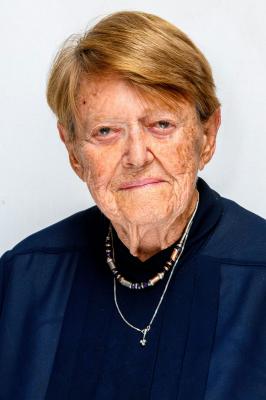I, Shoshana Weis, the spoiled child of my family, found myself against my will in the Mogilev ghetto in Transnistria – at the age when children study in elementary school. I didn't get to study, because already on my first day of first grade, I was expelled from school. After we were taken to Transnistria along with other Jewish families, my father Zvi Herman was sent to forced labor and we – my mother Chana, me, and my four-year-old little sister Shulamit – remained behind. We were surrounded by hunger and disease.
Soon, my mother and sister fell ill with typhus, and I shouldered the fight for my family's survival. Every day, I would sneak out of the ghetto, knock on strangers' doors, and barter the few things I still had for a morsel of bread. And when the objects ran out? I would go, a little girl, just eight years old, and offer myself as help in the household, to strangers. Hours of hard work only to bring a little bread to my mother and sister.
My sister's condition worsened and she was taken to the hospital. Every day, I would sneak into the hospital, to nourish my sister and raise her spirits. One day, the Ukrainian nurse refused to admit me. I cried and threw myself on the floor. Finally, we were brought in, my aunt and I, only to discover my sister in the morgue on top of the pile of bodies. My aunt Erna grabbed her little body and hid her under her coat, and we ran out of the hospital. We discovered that Shulamit was still breathing and we managed, in unbearable conditions, to bring her back to life.
We Jews were a civilian population, mainly old men, women and children. Weekday Jews and Sabbath Jews. We could not take up arms and fight the Romanians, the Germans, and their allies. Our daily life was a continuous struggle for survival in the shadow of acts of persecution and murder – and within all this, manifestations of resistance and heroism. Thus, my uncle Leopold, who secretly put on tefillin, was caught and thrown into the waters of the Dniester. Thus, my mother, with the approach of the front and the shelling from above us – running amok out of the ghetto, trying to escape our fate – lay down on me and my sister to save us from the bullets. Thus, the Jewish doctor, who ran during the gunfire to help the Jews who were injured, was himself killed.
Snippets of life. Many stories, small but great, testify to the human spirit and heroism. They attest to the ability to rise from the dead to help, to aid, to save and to maintain one's humanity, in inhumane conditions.
They tried to destroy us but we won, because our spirit was not broken.
And we defeated them, the Germans and their collaborators.
Against all the odds, we survived.
I was privileged to immigrate to Israel. I married Baruch Arieh, z"l, a Holocaust survivor from Hungary, and together we established a Jewish home and a glorious family.
I became a teacher and educator. I, who was expelled from first grade, raised generations of students, whom I educated to love people and to love Israel.
I stand here before you on this special evening, and call on all of us to come together and unite, to protect our people and our homeland – because we have no other.
Shoshana Weis
Shoshana Weis (née Schapira) was born in 1934, in Vatra Dornei, Romania.
In 1941, Shoshana and her family were deported to Transnistria.
When her father Zvi Herman was sent to forced labor, seven-year-old Shoshana took on the burden of supporting her sick mother Chana and her younger sister Shulamit.
After her sister was hospitalized, Shoshana would come to the hospital every day, in order to keep an eye on her and raise her spirits.
One day, a nurse informed her that she could not enter the hospital, because her sister had passed away.
With the help of her aunt, the two came to recover Shulamit's body from the morgue, only to discover that she was still alive. Thus, Shoshana saved her sister from certain death.
At the war's end when the family members returned home, Shoshana, who could not bear the lingering antisemitism, immigrated to Israel alone in 1948.
Her mother and sister stayed behind, in order to wage an eleven-year struggle for Zvi Herman's release from prison, where he was sent because of his Zionist beliefs.
Shoshana completed her law studies and became an educator. Today, she volunteers at the Amcha Holocaust survivor support organization and at ORT Leibovitz High School in Netanya, where she nurtures students with behavioral and other difficulties.







